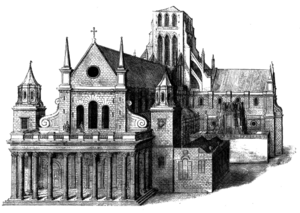Richard Hunne facts for kids
Richard Hunne was a London merchant tailor during the time of King Henry VIII (1509-1547). He had a big disagreement with his priest about his baby son's funeral. Hunne wanted to use the regular English courts to challenge the church's power. Because of this, church officials arrested him. They planned to try him in a church court for heresy, which meant having beliefs that went against the church.
In December 1514, while waiting for his trial, Hunne was found dead in his prison cell. Many people suspected that church officials had murdered him. His death made many people very angry at the clergy (church leaders). This led to months of political and religious trouble.
Contents
Who Was Richard Hunne?
The Funeral Dispute
In March 1511, Richard Hunne's five-week-old son, Stephen, died. After the funeral, Hunne refused to pay the usual fee to the priest, Thomas Dryffeld, at St Mary Matfelon church. This fee was often the baby's christening robe. The church did not immediately act on this.
However, in November 1511, Hunne and a friend challenged another priest about land ownership. After this, the priest from St Mary Matfelon sued Hunne for the unpaid funeral fee. In April 1512, Hunne appeared in a church court. The court decided that Hunne had to pay the fee.
Challenging Church Authority
On 27 December 1512, Hunne went to church again. The priest refused to continue the service until Hunne left. The priest shouted that Hunne was "accursed," meaning he had been excommunicated by the church court.
In January 1513, Hunne fought back. He sued the priest for slander, saying the priest's words had hurt his reputation and business. Hunne also made a serious charge against the church court itself. He argued that the church court's power came from the Pope's representative, which meant it was a foreign court. He believed it had no right to judge the King of England's subjects. This type of challenge was called a praemunire charge.

Arrest and Death
The London clergy then charged Hunne with heresy. This was a very serious accusation. In October 1514, officials searched Hunne's house. They found an English Bible with notes that seemed to support the ideas of John Wycliffe. Wycliffe's teachings were considered against the church at that time.
Hunne was sent to the Lollards' Tower, a prison at Old St Paul's Cathedral. On December 4, 1514, he was found hanging in his cell. The way he died seemed very suspicious. People in London became very angry at the clergy.
Even after his death, the church went ahead with Hunne's heresy trial. He was found guilty. His body was then burned on December 20.
What Happened Next?
The Crisis Grows
The problems between the church and the public kept growing. Bishop FitzJames of London wrote to Archbishop Wolsey, who was the King's Chancellor. The Bishop asked Wolsey to convince the King to stop a trial for a church official named Horsey. Bishop FitzJames believed Horsey would not get a fair trial because people were so angry at the church. He said that any jury in London would condemn Horsey, even if he was innocent.
Eventually, King Henry VIII stepped in to calm the situation.
King Henry's Decision
Horsey was kept in prison until the anger in London lessened. He was then brought before a civil court. However, King Henry had told his attorney general to make sure the case was dismissed. This meant Horsey was set free because there was not enough evidence.
Horsey's release made the public even angrier. The Parliament became more and more involved in the issue.
To try and fix things, Wolsey went before Parliament. He knelt and apologized to them on behalf of the clergy. But Wolsey really wanted Parliament to agree to have the case tried in Rome. Then, the King intervened again. He rejected Wolsey's idea. King Henry stated that he, as the ruler, had already made his decision. He said that only God himself had the right to overrule the King's decision.
Later, Wolsey fined Horsey and sent him far away from London. Horsey lived the rest of his life in poverty.
The Impact of Hunne's Case
Changes in Law?
In 1515, because of Richard Hunne's case, Parliament discussed a new law. This law would have given Hunne's children back the property their father lost when he was found guilty of heresy after his death. The House of Commons also asked King Henry VIII to change the law about funeral fees. There were also attempts to make laws against "benefit of clergy," which was a special right that allowed church members to be tried in church courts instead of civil courts. However, none of these suggested laws were passed.
A Story of Unfairness
John Foxe later wrote about Hunne's case in his famous book, Acts and Monuments. Foxe used Hunne's story to show how unfair and unaccountable English church courts were just before the English Reformation. He also presented Hunne as a martyr and someone who helped prepare the way for Protestantism in England, which came after Martin Luther's protests.
An anonymous writer in 1537 also wrote about Hunne's death. This writer saw similarities between Hunne's case and King Henry VIII's efforts to bring church courts under the control of the state.
Images for kids
 | Precious Adams |
 | Lauren Anderson |
 | Janet Collins |


